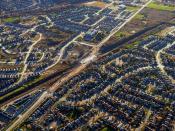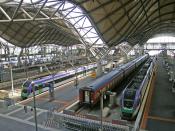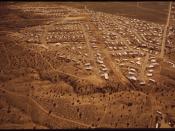Too often, we become so consumed by what presents to be the problem that we overlook what might be an obvious solution. The problem of urban sprawl is abundantly clear to everyone who daily needs to commute in capital cities whether by car or public transport - and the forecasts offer little relief. Melbourne's population is predicted to grow to almost 7 million in the next 40 years, while the Port of Melbourne projects that B-double truck traffic will grow from 1.5 million a year at present to 5 million by 2030. Treasury secretary Ken Henry warned that the changes ahead ''will test the limits of sustainability: economic, social and environmental''. And previous reports have detailed the much heralded proposals of Sir Rod Eddington for metropolitan rail links and tunnels as a means of managing Melbourne's truck traffic. While there can be no argument about the need for more efficient freight and public transport, we would appear to have lost sight of the obvious solution - regional centres.
As we rightly give attention to the needs of our capitals in light of their spiralling growth, we ignore the fact that many of our regions stagnate or decline. It makes little sense. Surely the interests of Melbourne and the other capitals would be better served by focusing on measures that make regional Australia more viable and more attractive as destinations to live and work. Those of us living in the regions are all too familiar with their attractions. We choose to live here because we love the lifestyle, their liveability, their sense of community, room to move and clean air. Increasing the attraction of Australia's regions requires attention to the fundamentals. Access to quality health care, pathways to further education and an efficient transport system are key...


